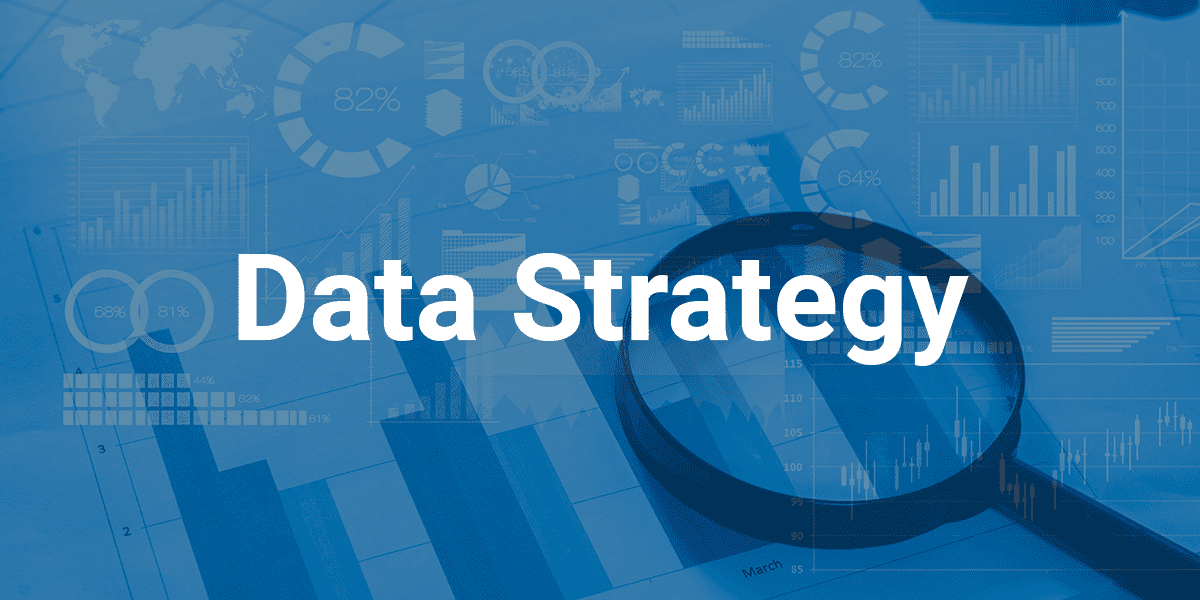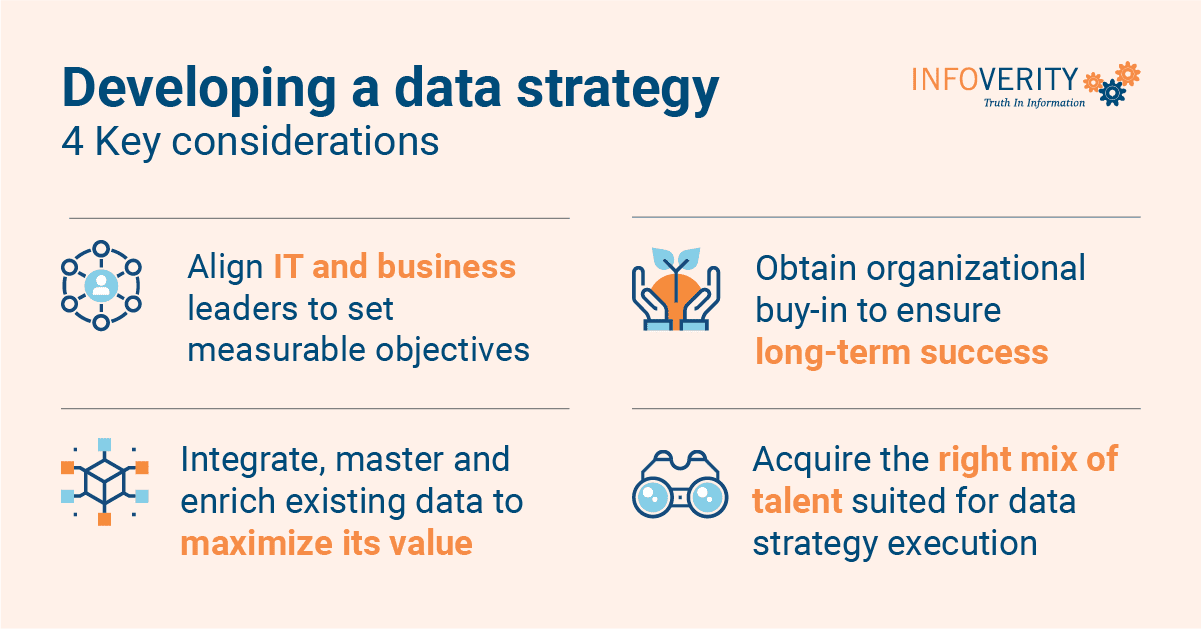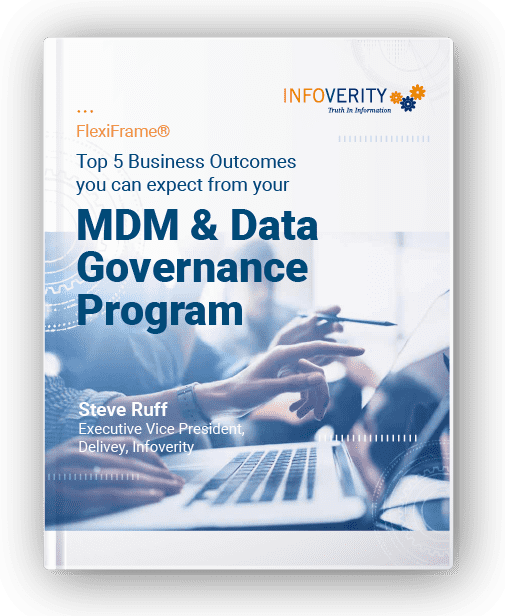Data strategy and digital transformation have emerged as pivotal drivers for success in today’s rapidly evolving business landscape. They are key factors in the strategies being executed by industry leaders and the biggest companies in the world.
In fact, Coca-Cola invested $925M in its digital transformation in 2022. And, that is only one example of the amount these companies are investing in their large-scale digital transformations.
Implementing innovative solutions requires this level of commitment, both in terms of time and budget. Furthermore, without establishing a solid foundation for your digital transformation, you’re putting that investment at risk. Strategic initiatives of this magnitude require a well-defined data strategy.
Data strategy and digital transformation: Table of Contents
What is a data strategy?
A data strategy is an effective, long-term plan for advancing Enterprise Data Management initiatives. Executive management uses this as a catalyst for innovation, guiding them on how to maximize their information assets.
The effectiveness and efficiency of any business undertaking hinge on an organization’s ability to leverage its own data. Consider a hospital whose goal is to improve patient outcomes. In this scenario, a well-defined data strategy empowers executive management to discern trends, such as treatment efficacy and prevalent ailments. These insights enable the hospital to allocate resources for targeted training or procure specialized equipment, thereby enhancing patient care as a result.
Regardless of its breadth or focus, a data strategy first and foremost requires a clear definition of an organization’s strategic objectives. These objectives serve as the guiding principles to determine the necessary data, resources, investments, and tools required to realize desired outcomes.
What is the purpose of a company’s data strategy?
Across industries, data officers who lead value-stream-based collaboration are predicted to outperform their counterparts by 2025. Having a well-defined strategic vision is a key component of running those data-driven operations. A strategic vision that drives actionable outcomes will consider:
- Requisite quality standards that allow businesses to innovate and adopt new technologies and data models.
- Business objectives with step-by-step milestones and clear metrics for each milestone.
- Influences on consumers, leveraging data about preferences, behaviors, and purchase patterns.
- Data security that safeguards customer data
- Gaps and opportunities, such as new revenue streams, within businesses.
As a company invests in and adopts new technologies, its data strategy acts as the North Star, providing a consistent framework for maximizing data across departments.
4 key considerations for developing a data strategy
While you are considering your data strategy, these best practices are essential to unlocking value from enterprise data..
1. Align IT and business leaders to set measurable objectives
First, you should ensure that your IT and business leaders are working together align your data strategy with your business’ evolving expectations. A majority of modern organizations (87%) follow this best practice.
Having this alignment allows management to identify the most critical business goals, activities and challenges. Additionally, it also facilitates a better understanding of how different departments use data to make decisions and where their most valuable data lives. Prioritizing data-driven decision-making ensures consistency and efficiency while navigating key decisions along the way.
Setting clear, measurable objectives to go along with this organizational alignment helps organizations quantify the success of their digital transformation initiatives. Although, this step isn’t a one-and-done. Data strategy development requires senior management to remain engaged throughout the process and beyond.
2. Obtain organizational buy-in to ensure long-term success
Secondly, remember that a well-executed data strategy involves every employee. From all levels of the organization, and from all aspects of the business – enterprise data management impacts how every person operates daily.
Establishing a data-driven culture will help organizations lean into their data management strategy. A company with this culture is 4.6 times more likely to rely on data to make major decisions.
Here’s how to make it possible:
- Make data literacy a priority. Every team member should have a basic understanding of data, its use, and how it can add value. Define common definitions, principles, and metrics across the company, organizing internal training where necessary.
- Make data understandable to non-technical teams. Data can be presented in multiple ways to appeal to a broader range of people.
- Model data-first behavior starting at the top. Designating a data champion, or someone with business and IT knowledge, to guide employees and leaders can serve as an example for how to prioritize data-driven decision-making.
- Gather feedback throughout the process. Ensure everyone is on the same page every step of the way, and take those opportunities to discover additional ways to maximize your investment. This will ensure lasting and impactful change.
3. Integrate, master and enrich existing data to maximize its value
Thirdly, ensure that you are optimizing the data that you already have, integrating it to maximize its visibility.
Organizations often use disparate channels, tools, standards, and processes to manage their enterprise data. This creates silos that lead to knowledge workers chasing data – in fact, evidence shows that they are devoting 12 hours per week to this.
Particularly, to create a solid enterprise data strategy, companies must sort through their information sources and determine which are most valuable. One way to approach this effort is to conduct an audit that identifies critical business data, processes and infrastructures. Specifically, the components of data audits include:
- Data inventory
- Data profiling
- Data quality assessment
- Data workflow analysis
- System evaluation
- Compliance and security assessments
As data becomes clearer and better understood, companies can use it more effectively to drive business decisions.
4. Acquire the right mix of talent suited for data strategy execution
Finally, consider that a lasting transformation requires deep expertise, and invest in the talent you need to execute your vision.
The transformation into a data-driven organization doesn’t take place in a vacuum. Developing a data strategy requires extra analysis and tools. Therefore, it takes the right people in the right roles to establish and maintain new data governance processes and standards.
With this in mind, organizations must assess whether they have enough skilled individuals, or if new hires are needed. They can choose to recruit internally or outsource this expertise. Both cases will allow them to gain specialized knowledge and skills. However, outsourcing, particularly to an organization, is often more cost-effective, comprehensive, and scalable
Looking for data strategy guidance?
Infoverity can help your business in every step of the data strategy process. To discover more on how we can help you 
How Infoverity helps enterprises develop an effective data strategy
Because each journey is different, and because there is so much at stake as you consider your data strategy, Infoverity offers solutions for companies at any stage of their digital transformation process, including building the business case to make your investment in enterprise data management, and platform selection. Here’s what we offer:
- Enterprise Data Management (EDM) Strategy: Companies need to understand how to leverage data for business success. Through Infoverity’s experience and expertise, we can help you define your value propositions, quantify business impacts, and develop a data strategy that meets your goals.
- Vendor Selection: Infoverity provides clients with vendor selection advice and recommendations on data management platforms that meet their requirements. In the sea of options, matching tools with business needs is key to making the right selection for your investment to be relevant in the long term.
- Implementation Blueprint: After vendor selection comes platform implementation. Infoverity works with you to boost organizational buy-in and user adoption, laying out a clear plan for the initial implementation goals of your data management platform.
- Health Checks: Infoverity determines whether your data management requirements have changed and optimizes your system accordingly. This service can be performed regularly.
With these four offerings, Infoverity meets you at your digital transformation stage. To summarize, we offer modern companies a unique mix of Strategy and Implementation expertise that is built on more than a decade of thought leadership.
A better data strategy: take the first step
A well-defined enterprise data strategy underpins successful digital transformation. Keep these best practices in mind as you continue on your enterprise data management journey – or work with industry experts for effective guidance. Explore our right-sized solutions here.



